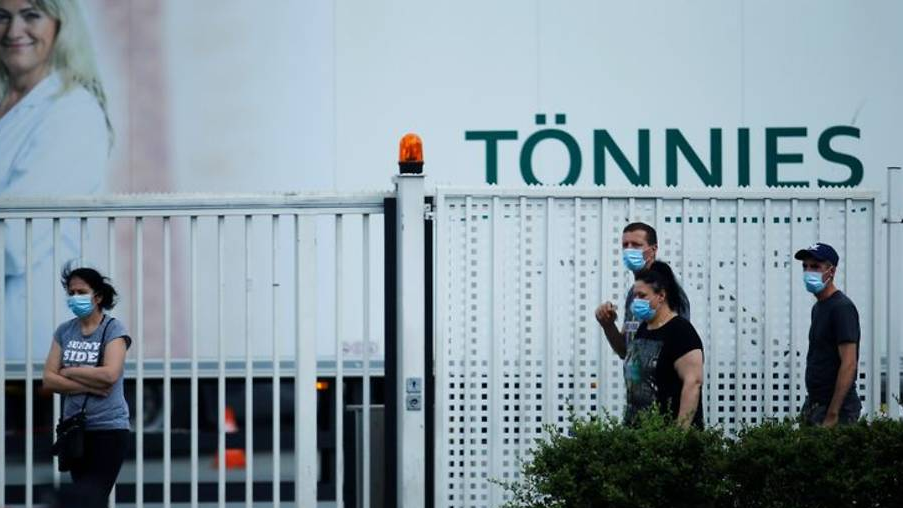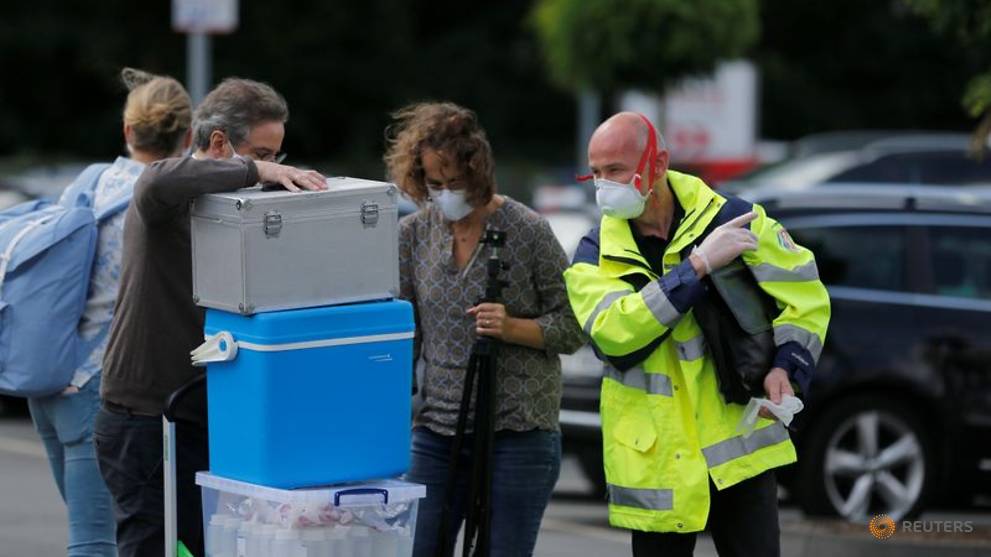
Employees are seen outside the main Toennies meat factory that had to be shut down because of the coronavirus outbreak among its employees, in Rheda-Wiedenbrueck, Germany, June 20, 2020. /Reuters
Employees are seen outside the main Toennies meat factory that had to be shut down because of the coronavirus outbreak among its employees, in Rheda-Wiedenbrueck, Germany, June 20, 2020. /Reuters
The reproduction rate of the novel coronavirus in Germany has jumped to 1.79 after a raft of localized outbreaks, the Robert Koch Institute (RKI) for public health said on Saturday, far above the level needed to contain it over the longer term.
A reproduction rate of 1.79 means that 100 people who contracted the virus infect 179 other people on average. A rate of less than one is needed to gradually contain the disease.
The number, a sharp increase from 1.06 on Friday, is a setback for the European Union's most populous country, which has fared better in the pandemic than many European peers due mainly to early testing and social distancing measures.
The institute attributed the rise to a number of local outbreaks, which have been seen in locations such as meatpacking plants, logistics centers, and shelters for refugees. Outbreaks have also been linked to church services and family parties.
Earlier this week, a meat processing plant in the western state of North Rhine-Westphalia in Germany reported an outbreak of the novel coronavirus when 400 workers tested positive. By Friday, that number had doubled to 803 and the number now has risen to 1,029, according to officials.
The factory has been closed for 14 days following initial reports of the outbreak, prompting local health authorities to order all 6,500 employees and their families to go into quarantine. Schools and childcare centers in the western city of Guetersloh were also closed by local authorities.
The plant is run by Toennies – the largest meat processing firm in Germany. China on Thursday banned all products from the slaughterhouse, after it was alerted by German authorities to the cluster of infections and considering the current uncertainties caused by the new outbreak in a fresh food market in Beijing that has raised fears among the public that fresh meat may be the source of the new domestic outbreak.

Local government officials are seen outside the main Toennies meat factory in Rheda-Wiedenbrueck, Germany, June 20, 2020. /Reuters
Local government officials are seen outside the main Toennies meat factory in Rheda-Wiedenbrueck, Germany, June 20, 2020. /Reuters
Aside from meat processing firm Toennies, a slaughterhouse in the northern state of Schleswig-Holstein also logged over 100 cases while another plant in Bavaria reported around 60 cases. Over the weekend, a new outbreak emerged at a slaughterhouse in the state of Lower Saxony, with at least 92 employees testing positive.
Food markets around the world have become new 'hotbed'
The premier of the western North Rhine-Westphalia region warned that it faces the threat of a renewed lockdown amid the spiraling outbreak at the slaughterhouse.
"Since case numbers in Germany are generally low, these outbreaks have a relatively strong influence on the value of the reproduction number," RKI said. "A nationwide increase in case numbers is not anticipated."
When smoothed for short-term effects, the government-affiliated institute estimated the country's reproduction rate at 1.55, up from 1.17 on Friday.
Even though the management of the coronavirus crisis in Germany has been among the most successful in Europe, the country has seen repeated outbreaks in slaughterhouses, whose employees are often migrants living in crowded company-provided accommodation.
Chancellor Angela Merkel had favored maintaining lockdown discipline for longer, but Germany eventually eased restrictions following pressure from regional premiers.
(With input from agencies)